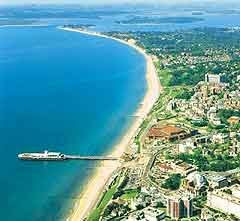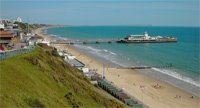
As I was running along the seafront (I keep wanting to say "lakefront" as I'm so used to Chicago), there are 7 miles of paved path from Hengistbury Head down to Poole. In some sections, there's also ability to drive cars and park along the beachfront on paved roads. The beach area is rather nice with fine, sandy beaches, whereas I'm told some areas further East (Brighton, for example) are covered with pebbles.
Along the paved area are little "huts". Families/friends can rent a little hut for the week as they are vacationing locally. It is a place to store your belongings and an ice chest with food, etc. Usually there's a hotplate available, but I assume it requires you to bring your own gas source. I don't think there is any electricity to the huts. You might classify these as "cabanas", but they are very minimalistic and in many cases, run-down. But as it's just a daily beach storage area, I guess you don't need much more than a roof over your head.
While there is sand all along the seafront, the beach has "groynes" interspersed along the beach. Basically, there are metal low-rise walls that extend out into the water. They are used to minimize coastal erosion of the sand as the waves approach land, although there is question as to how effective.
You will also see a couple of piers that extend out into the water. Bournemouth city centre has a pier that extends out quite a ways, similar to Santa Monica pier, but not quite as big or built-up as Navy Pier. There is a restaurant/bar and theatre on the pier, as well as a tacky amusement section (ferris wheel and other rides for tykes). There is also a small pier at Boscombe, and another further down, even smaller.
Almost invariably along the shore you will see surfers (YES, surfers!), well, I guess more like wakeboarding. Usually the waves are more like swells in the water, but as I ran last night, there were actually some crests and crashing waves. As the water is EXTREMELY cold, they are all in wetsuits. But still..... Even at 8pm, there were still surfers on the water.




